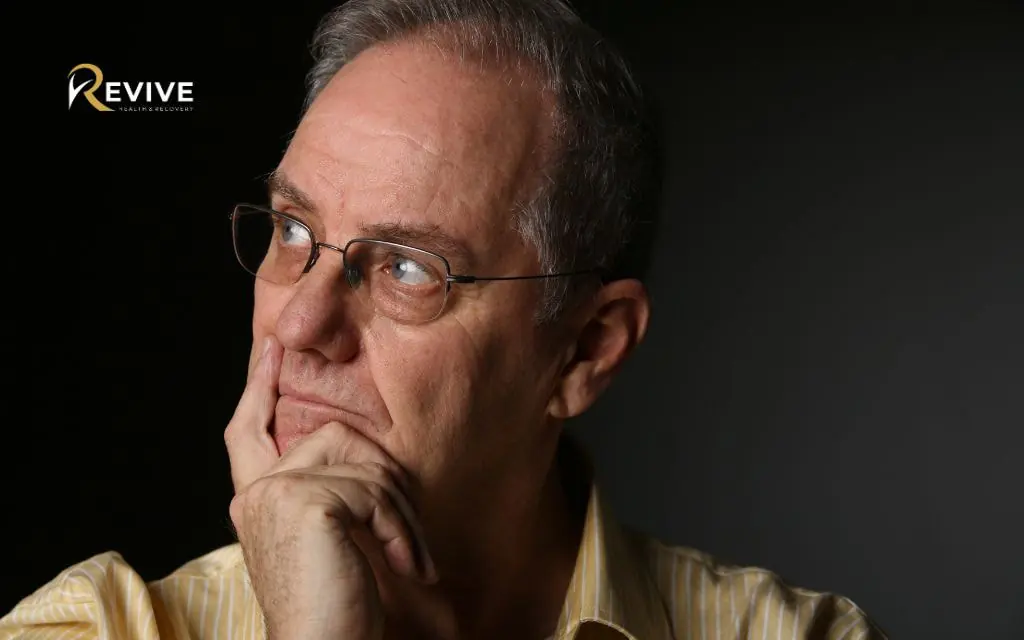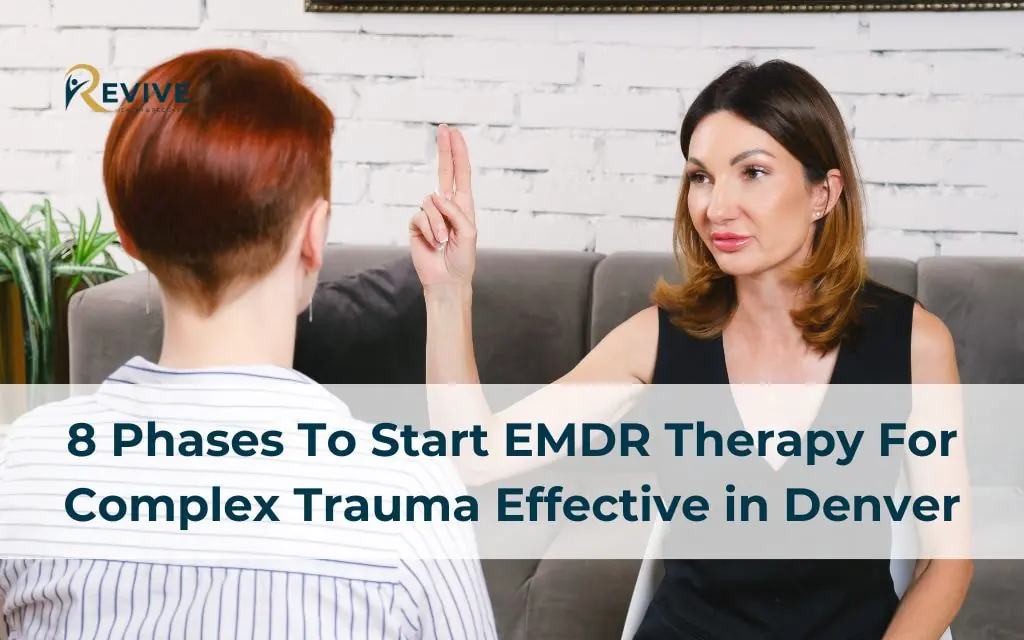Colorado is facing a growing mental health crisis, with rising rates of trauma-related conditions affecting individuals across all walks of life. For those navigating the deep scars of prolonged or repeated trauma, there’s hope – EMDR Therapy for Complex Trauma offers a powerful, evidence-based path to healing. Unlike traditional talk therapy, EMDR helps reprocess painful memories and reduce emotional distress through guided eye movements and bilateral stimulation.
At Revive Health Recovery, a trusted provider in Denver, we specialize in trauma-informed care that’s personalized, compassionate, and effective. This article explores the science behind EMDR, real trauma recovery insights, and how you can take the next step toward reclaiming your life.
Understanding Complex Trauma
What is Complex Trauma?
Complex trauma results from prolonged, repeated traumatic experiences – often occurring during vulnerable developmental periods. In Colorado communities, we frequently see complex trauma stemming from childhood abuse, neglect, domestic violence, or persistent household dysfunction. Unlike single-incident trauma, complex trauma embeds itself deeply in a person’s identity and nervous system, creating lasting impacts on mental health and daily functioning.
At Revive Health Recovery, we recognize that complex trauma requires specialized understanding and treatment approaches tailored to each individual’s unique experiences.
Complex Trauma vs. Single-Event Trauma
Complex trauma differs significantly from single-event trauma. While a car accident or natural disaster might trigger post-traumatic stress disorder (PTSD) from one defining moment, complex PTSD develops from sustained traumatic circumstances—like ongoing childhood neglect or repeated abuse—where escape seemed impossible.
This distinction matters because complex trauma alters developmental pathways and core beliefs about oneself and the world. In Denver, we’re seeing increasing recognition that these different trauma types require distinct treatment approaches. Complex trauma therapy must address not only traumatic memories but also disrupted attachment patterns and identity formation.
Symptoms of Complex Trauma
Complex trauma manifests through various symptoms that can significantly impact daily life. People experiencing complex trauma often struggle with:
- Emotional dysregulation—difficulty managing intense feelings
- Dissociation—feeling disconnected from oneself or surroundings
- Negative self-concept—persistent feelings of worthlessness or shame
- Relationship difficulties—trust issues and boundary challenges
- Chronic anxiety and hypervigilance
- Body-based symptoms including chronic pain or tension
These symptoms create real challenges for many Colorado residents, affecting their ability to maintain relationships, perform at work, or experience joy and connection. The good news is that effective treatments like EMDR therapy exist specifically for these complex trauma symptoms.

What is EMDR Therapy?
The Origins of EMDR
Eye Movement Desensitization and Reprocessing (EMDR) therapy was developed by American psychologist Dr. Francine Shapiro in 1987. While walking in a park, Dr. Shapiro noticed that her distressing thoughts diminished as her eyes moved rapidly from side to side. This observation led her to develop a structured approach to trauma healing that has since gained worldwide recognition.
Dr. Shapiro’s pioneering work earned numerous accolades, including the American Psychological Association’s Award for Outstanding Contributions to Practice in Trauma Psychology. Her therapy is now practiced globally and has helped millions recover from trauma.
How EMDR Works
EMDR therapy operates on the principle that traumatic memories can become “frozen” in the brain in their original, distressing form. During therapy sessions, bilateral stimulation—typically through guided eye movements, alternating tones, or tactile stimulation—activates the brain’s natural information processing systems while the client focuses on traumatic memories.
This process helps the brain reprocess these memories, integrating them into normal memory networks and reducing their emotional charge. EMDR follows the Adaptive Information Processing model, which suggests that when traumatic memories are properly processed, emotional distress naturally decreases and healthier perspectives emerge.
Unlike traditional talk therapy, EMDR doesn’t require extensive discussion of painful details or homework between sessions, making it approachable for many who find other therapies challenging.
Why EMDR Excels for Complex Trauma
The 8 Phases of EMDR
EMDR therapy follows a structured eight-phase protocol that provides consistency and safety for trauma processing:
- History Taking: Your therapist gathers information about your history and identifies treatment targets.
- Preparation: You’ll learn self-regulation techniques to manage emotional intensity during and between sessions.
- Assessment: Together with your therapist, you’ll identify specific memories to process, including associated images, beliefs, emotions, and physical sensations.
- Desensitization: Using bilateral stimulation, you’ll process the traumatic memory until distress levels decrease.
- Installation: Positive beliefs replace negative self-perceptions associated with the trauma.
- Body Scan: You’ll check for any remaining physical tension related to the memory.
- Closure: Each session ends with stabilization techniques, ensuring you leave feeling grounded.
- Reevaluation: At the beginning of subsequent sessions, your therapist checks progress and determines next steps.
For complex trauma, therapists often extend the preparation phase to build necessary coping skills before memory processing begins.
Adaptations for Complex Cases
When working with complex trauma, skilled EMDR therapists at Revive Health Recovery modify standard protocols to ensure safety and effectiveness. This might include:
- Extended resourcing and stabilization before memory processing
- Specific techniques to manage dissociation
- Careful attention to the therapeutic relationship
- Integration of attachment-focused approaches
- Systematic work with emotional regulation
These adaptations create a framework where even those with severe trauma histories can process their experiences safely and effectively.
Evidence of Effectiveness
Research consistently supports EMDR therapy’s effectiveness for treating complex trauma. A landmark study by Chen et al. (2018) demonstrated significant symptom reduction for complex PTSD patients after EMDR treatment, with benefits maintained at follow-up.
The EMDR International Association (EMDRIA) and major health organizations worldwide recognize EMDR as an evidence-based trauma treatment. For complex trauma specifically, research shows EMDR helps resolve symptoms that other therapies might struggle to address, particularly those stored in non-verbal, sensory-based memory systems.

Benefits of EMDR Therapy for Complex Trauma
EMDR therapy offers unique benefits for individuals struggling with complex trauma or PTSD. Here’s why the ‘benefits of EMDR therapy for complex trauma’ made this as an effective treatment:
Significant Reduction in PTSD Symptoms
EMDR helps decrease trauma-related symptoms like flashbacks, nightmares, and anxiety. Many clients report feeling a sense of relief and emotional freedom after treatment, no longer overwhelmed by distressing memories. By reprocessing trauma, EMDR reduces feelings of fear, guilt, or sadness, allowing you to feel more like yourself again.
Faster Results Than Traditional Talk Therapy
Unlike traditional talk therapy, which often requires repeatedly discussing traumatic experiences, EMDR works by directly reprocessing traumatic memories. Many people notice improvement in fewer sessions compared to methods like cognitive behavioral therapy (CBT). While complex trauma still takes time to heal, EMDR can accelerate symptom relief, helping you move forward faster.
Scientifically Proven and Widely Recommended
EMDR is backed by decades of research and endorsed by major health organizations, including:
- The U.S. Department of Veterans Affairs and Department of Defense
- The World Health Organization (WHO)
- The International Society for Traumatic Stress Studies (ISTSS)
Studies, such as this NCBI research, show EMDR leads to measurable brain changes and lasting trauma recovery, making it a trusted, evidence-based treatment.

What to Expect from EMDR Therapy
Inside a Session
A typical EMDR session lasts 60-90 minutes. After checking in about your current state and reviewing coping skills, your therapist will guide you to focus on a specific traumatic memory while engaging in bilateral stimulation.
This might involve following the therapist’s fingers with your eyes, listening to alternating tones through headphones, or holding small buzzers that activate alternately in each hand. Throughout the process, your therapist provides support while allowing your brain’s natural healing processes to work.
Sessions often evoke strong emotions or physical sensations as memory processing occurs. Your therapist will help you navigate these experiences safely, ensuring you remain within your “window of tolerance” where processing can happen effectively.
Treatment Timeline
For complex trauma, EMDR therapy typically requires more sessions than for single-incident trauma. Most clients need 8-12+ sessions, though this varies based on trauma severity, complexity, and individual factors.
The initial phases focusing on history-taking and stabilization may extend over several sessions for complex cases. Once memory processing begins, many clients notice gradual improvements in symptoms, though healing isn’t always linear. Your therapist will regularly assess progress and adjust the treatment plan accordingly.
Handling Challenges
EMDR therapy for complex trauma may present challenges including:
- Emotional intensity: Your therapist will teach grounding techniques to manage overwhelming feelings
- Dissociation: Specific protocols help address disconnection during processing
- Between-session effects: Processing sometimes continues between appointments; your therapist will provide strategies for self-care
These challenges represent normal parts of the healing process. With skilled guidance, they become opportunities for growth rather than obstacles to recovery.
Steps to Start EMDR Therapy for Complex Trauma
Starting EMDR therapy can feel overwhelming, especially if you’ve been dealing with complex trauma for a long time. The good news is that beginning your healing journey is a clear and manageable process. Here’s how to start EMDR therapy for complex trauma:
Step 1: Find a Qualified EMDR Therapist
Look for a licensed mental health professional trained in EMDR. Not all therapists offer EMDR, so using reputable directories is key:
- EMDR International Association (EMDRIA): Search their Find a Therapist tool for EMDR-trained professionals in Denver.
- Psychology Today: Use the specialty filters to find local EMDR therapists and read their bios.
- Trauma-Focused Therapy Centers: Clinics like Revive Health Recovery specialize in EMDR therapy for complex trauma.
For complex PTSD, finding an EMDRIA Certified Therapist or one with advanced trauma experience is ideal. Check their credentials, reviews, and any additional training in dissociation or childhood trauma.
Step 2: Schedule an Initial Consultation
Many therapists offer free phone consultations. Use this time to ask questions like:
- How much experience do you have with EMDR and complex trauma?
- What’s your approach to EMDR for multiple traumas?
Pay attention to how they communicate—do you feel heard and understood? This first conversation also helps clarify logistics like scheduling, fees, and insurance coverage.
Step 3: Prepare for Your First EMDR Session
Your first few sessions won’t immediately dive into trauma processing. Instead, your therapist will:
- Gather background information and trauma history.
- Teach coping strategies (breathing techniques, grounding exercises).
- Identify potential trauma targets for EMDR.
You don’t need to list every trauma beforehand—your therapist will guide the process. To prepare, consider keeping a journal of symptoms or triggers. Having self-care practices in place (music, meditation, supportive friends) can also help as you begin therapy.
Step 4: Address Common Misconceptions
Before starting EMDR, it helps to clear up some myths:
- EMDR is not hypnosis – you stay fully conscious and in control.
- You won’t forget your trauma – instead, the emotional intensity linked to it will decrease.
- EMDR is research-backed – it’s recommended by organizations like the VA and WHO.
If you have concerns, talk to your therapist. Understanding how EMDR works can help you feel more confident about starting.
Step 5: Plan the Logistics
Set up a consistent therapy schedule that fits your routine. EMDR sessions are typically 60-90 minutes, so make sure you have time to process afterward.
- In-person sessions? Plan your commute for a stress-free arrival.
- Virtual EMDR? Test your internet connection, find a private space, and consider using headphones for better focus.
Some people like to have a comforting item nearby (like a blanket or stress ball) during EMDR-this is perfectly okay. The goal is to create a safe, distraction-free environment for therapy.

EMDR vs. Other Therapies
EMDR vs. CBT
While both EMDR and Cognitive Behavioral Therapy (CBT) effectively treat trauma, they operate differently:
- CBT focuses on identifying and changing unhelpful thought patterns through conscious cognitive restructuring and often includes homework assignments.
- EMDR works directly with memory networks, using bilateral stimulation to facilitate natural processing, with less emphasis on conscious cognitive control.
For complex trauma specifically, EMDR can access and process implicit memories that may be difficult to address through purely cognitive approaches.
EMDR vs. DBT/TF-CBT
Other specialized trauma therapies include:
- Dialectical Behavior Therapy (DBT) emphasizes emotional regulation skills and distress tolerance, making it complementary to EMDR for those with severe emotional dysregulation.
- Trauma-Focused CBT (TF-CBT) combines exposure techniques with cognitive restructuring and is particularly effective for children and adolescents.
EMDR’s unique contribution lies in its ability to process traumatic material without requiring extensive verbal articulation of experiences, often making it accessible to those who struggle with traditional approaches.
Combining Treatments
For complex trauma, an integrated approach often yields the best results. EMDR frequently works well alongside:
- Medication management for symptom relief
- Group therapy for social support and skill development
- Somatic therapies addressing body-based trauma symptoms
- Mindfulness practices enhancing present-moment awareness
At Revive Health Recovery, we believe in personalized treatment plans that may incorporate multiple modalities for comprehensive healing from complex trauma.
Is EMDR Right for You?
Signs to Consider
EMDR therapy might be appropriate if you experience:
- Intrusive memories, flashbacks, or nightmares
- Emotional reactions that feel disproportionate to current situations
- Avoidance of people, places, or situations that trigger traumatic memories
- Negative beliefs about yourself that don’t respond to logical evidence
- Difficulty feeling safe or connected in relationships
- Physical reactions when reminded of traumatic events
These symptoms often indicate unprocessed traumatic memories that EMDR can effectively address.
Next Steps
If you recognize these signs, consider:
- Consulting with a trauma-informed therapist to discuss whether EMDR fits your specific needs
- Learning more about the process through reputable resources
- Preparing questions about how EMDR might address your particular symptoms
Remember that you control your healing journey. A good therapist will provide information and support without pressuring you toward any particular treatment approach.
Common Concerns and Side Effects of EMDR Therapy
We’re upfront—EMDR can stir things up:
- Emotional Ups: You might cry or feel edgy-it’s old stuff surfacing.
- Fatigue: It’s a mental workout-rest is key.
- Dreams: Vivid sleep is common as your brain sorts.

If you’re in crisis-severe dissociation or addiction-stabilize first. Cope by resting, hydrating, and talking to your therapist if it’s heavy. A client from Broomfield said, “Week one was tough, but by week four, I felt free.” It’s a process-we’re here for it.
Cost of EMDR Therapy for Complex Trauma in Denver
Let’s talk about money – because we believe healing shouldn’t break the bank. If you’re finding the cost of EMDR therapy for complex trauma in Denver, You’ve made it right to read this. In Denver, EMDR therapy costs can vary based on factors like the therapist’s experience, location (a high-end office in LoDo vs. a virtual session), and whether you’re meeting in person or online.
Here’s the breakdown:
- More Affordable Options: Newer therapists or virtual sessions often fall in the lower range while still providing high-quality care.
- Higher-End Sessions: Seasoned professionals or prime locations—like near Coors Field—tend to charge more.
Ways to Keep Therapy Affordable
- Insurance: Some plans, like Blue Cross Blue Shield or Cigna, may cover EMDR under “trauma therapy” benefits—check with your provider.
- Sliding Scale Rates: Many therapists adjust fees based on financial need—some sessions can be significantly reduced.
- Community Clinics: Places like the Denver Health Behavioral Center offer lower-cost therapy options.
Most people start with 6 to 12 sessions, but results can come sooner—one client from Centennial shared that just six sessions made a huge difference.
At Revive Health Recovery, we make therapy more accessible with flexible payment options, so you can focus on healing, not just the cost. Reach out to explore affordable EMDR therapy options near you!
Finding EMDR Therapists in Denver and Colorado
Why Certification Matters
When seeking EMDR therapy for complex trauma in Denver, certification through EMDRIA ensures your therapist has received comprehensive training. Certified therapists complete specialized education beyond their graduate degrees, including supervised practice and continuing education.
This certification guarantees your therapist understands the nuances of the protocol and can adapt it appropriately for complex trauma cases. At Revive Health Recovery, we prioritize advanced training and certification in trauma-informed care.
How to Find a Therapist
Several resources can help you locate qualified EMDR therapists in Colorado:
- EMDRIA’s Therapist Directory: Search specifically for certified therapists in Denver
- Psychology Today: Filter therapists by EMDR specialization
- Local mental health referral networks: Many Colorado organizations maintain lists of trauma specialists
Beyond Revive Health Recovery, other Denver-area options include The EMDR Center of Denver and Denver Wellness Counseling, which offers a free EMDR workbook and virtual sessions for residents throughout Colorado.
Choosing the Right Therapist
Finding the right fit for EMDR therapy involves several considerations:
- Verification of credentials: Confirm EMDRIA certification
- Complex trauma experience: Ask about specific training and experience with complex trauma
- Therapeutic rapport: Schedule a consultation to assess comfort and connection
- Practical factors: Consider location, cost, and schedule compatibility
Remember that the therapeutic relationship itself is a significant healing factor in trauma treatment. Trust your instincts when selecting a therapist for this important work.
FAQs About EMDR Therapy for Complex Trauma
How long does EMDR therapy take?
EMDR therapy typically takes 6-12 sessions for single-event trauma, but complex trauma may require more sessions for lasting healing.
Does EMDR work for all types of trauma?
Yes, EMDR is effective for both big and small traumas, whether recent or from years ago.
Can EMDR therapy be done online?
Absolutely! Many Denver therapists, including those at Revive Health Recovery, offer virtual EMDR sessions, making therapy more accessible.
What should I expect after my first EMDR session?
You may feel tired, have vivid dreams, or notice emotional shifts—all signs that your brain is processing memories.
Is EMDR good for childhood trauma?
Yes, EMDR is highly effective for childhood trauma, helping to reprocess deep-rooted emotional wounds.
Still have questions? Revive Health Recovery can guide you through the EMDR process and help you determine if it’s the right approach for your healing journey.
Why Revive Health Recovery Stands Out
At Revive Health Recovery in Denver, we specialize in trauma-informed EMDR therapy delivered by experienced, compassionate professionals. What sets us apart:
- Our team brings extensive training in complex trauma and dissociation
- We create individualized treatment plans addressing each client’s unique needs
- Our holistic approach incorporates complementary healing modalities when beneficial
- We emphasize building safety and trust before diving into trauma processing
- Our collaborative approach ensures you remain in control of your healing journey
We understand that seeking help for complex trauma requires courage. Our therapists create a supportive environment where clients feel respected, understood, and empowered throughout the EMDR process.
Conclusion
You don’t have to carry this trauma alone any longer. EMDR therapy for complex trauma has helped countless people, and it can help you too. The relief and freedom you’ve been hoping for might be closer than you think. We at Revive Health Recovery are ready to walk beside you as you move from surviving to truly thriving. Your story isn’t over, and the next chapters can be ones of healing, growth, and renewed hope. Take that step – we are here for you, and brighter days are ahead.
If you’re ready to take the next step or simply want to learn more, we encourage you to reach out to us.
Contact Revive Health Recovery
1427 S Federal Blvd, Denver, CO 80219,
(303) 268-4655
Email: contact@revivehealthrecovery.com.
Reaching out can be intimidating, but it’s a sign of strength – and our friendly staff will guide you through the process with compassion and respect.



